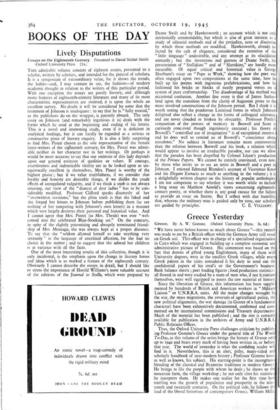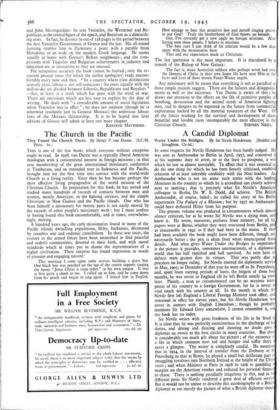Greece Yesterday
Greece. By A. W. Gomme. (Oxford University Press. 3s. 6d.)
"WE have never before known so much about Greece "—this 'remark was made to me by a British officer while the German Army still stood on Greek soil. This officer was in charge of a specialised organisation in Cairo which was engaged in building up a complete economic and administrative picture of Greece. His contention was based on the fact that dozens of gifted young Englishmen, many of them with University degrees, were in the smallest Greek villages, while every Greek patriot in the cities considered it his duty to send out the confidential papers of his rival's or the Government's business. Bank balance sheets ; port loading figures ; food production statistics: all flowed in and were studied by a team of men who, if not historians themselves, were well equipped to assess the raw material of history. I Since the liberation of Greece, this information has been supple- mented by hundreds of British and American workers in "Military Liaison" or U.N.R.R.A. units. All the major changes wrought by the war, the mass migrations, the reversals of agricultural policy, the new political alignments, the war damage (in Greece of a fundamental character) have been exhaustively documented, confirmed and com- mented on by international commissions and Treasury departments. Much of the material has been published and the rest is certainly available for publication in the archives of Army and U.N.R.R.A. Public Relations Offices.
Thus, the Oxford University Press challenges criticism by publish- ing Professor Gonune's Greece under the general title of The World To-Day, as this volume of the series brings the history of Greece only up to 5940 and bears every mark of having been written in, or before. that year. The world of yesterday is what the confiding reader will find in it. Nevertheless, this is an alert, pithy, many-sided and scholarly handbook of near-modern history ; Professor Gomme loves. as well as knows, his subject. His starting-point is the incongruous blending of the classical and Byzantine traditions in modern Greece He brings to life the people with whom he deals ; he shows us the mountain farm, the village workshop ; he not only cites his statistics he interprets them. He makes one realise for the first time ho-• startling was the growth of population and prosperity in the nine
teenth and twentieth centuries. On the political side, he follows di lead of the liberal historians of contemporary Greec..:.. William Mill and John Mavrogordato : he sees Venizelos, the Westerner and Re- publican, as the central figure of the epoch, and Royalism as a diminish- ing asset. In fact, he devotes 70 out of 128 pages to the period between the first Venizelist Government of Greece and the last. His all-round learning enables him to illuminate a point with a parable from Herodotus or an aside on the modern Greek language. He seems equally at home with Greece's Balkan neighbours ; and the com- parisons with Yugoslav and Bulgarian achievements in,industry and education are as instructive as they are unusual.
For scrupulous accuracy the book cannot be faulted ; only the re- current present tense (for which the author apologises) reads uncom- fortably every now and then. "In a country where class distinctions scarcely exist, labour is not self-conscious ; the poor, equally with the well-to-do, are divided between Liberals, Republicans and Royalists" —this, at least, is a truth which has gone with the wind of war. There are omissions which are less easy to explain .by the date of writing. He deals with "a considerable amount of social legislation when Venizelos was in office " ; he does not mention (though he is otherwise resolutely just to General Metaxas) the ambitious 'labour laws of the Metaxas dictatorship. It is to be hoped that later editions of Greece will admit at least one more chapter.
KENNETH MATTHEWS.



























 Previous page
Previous page